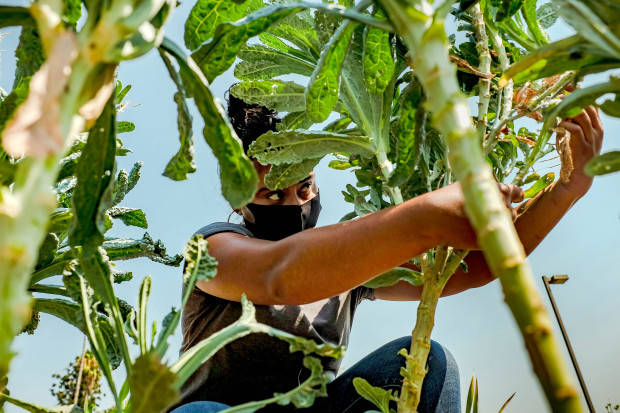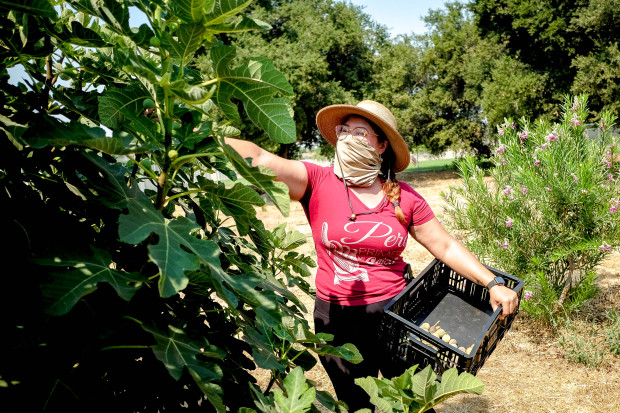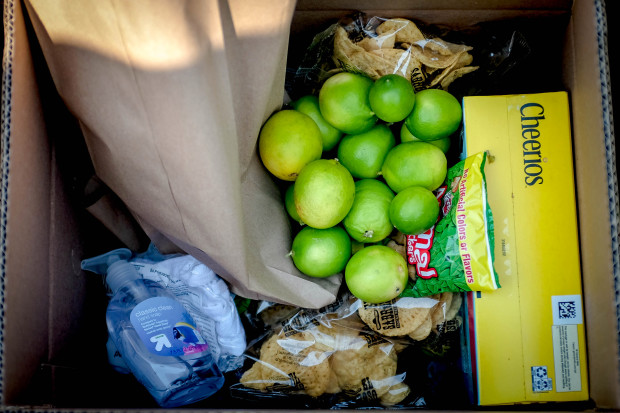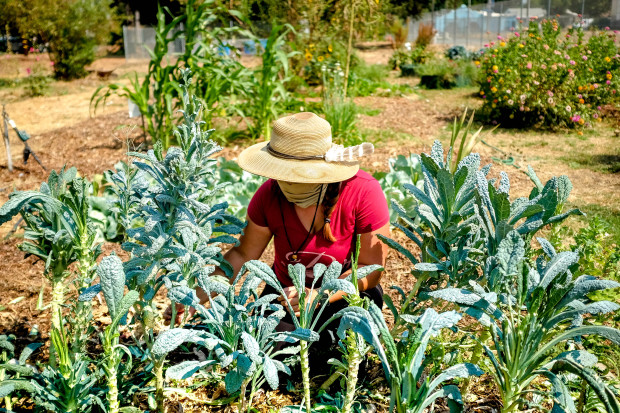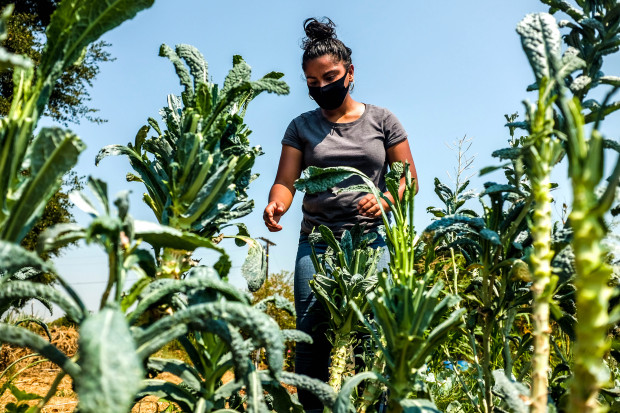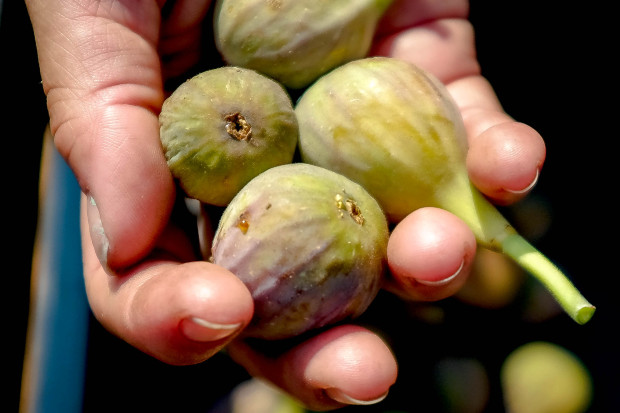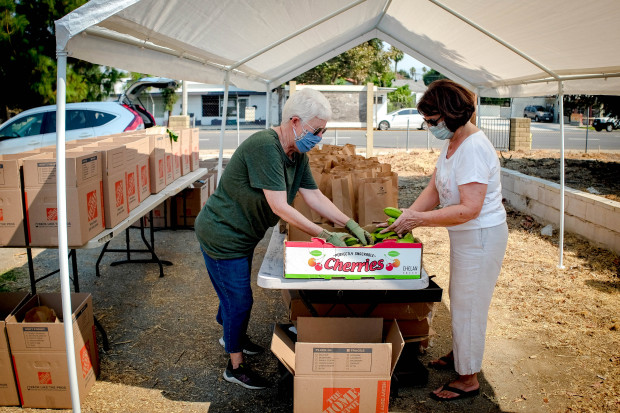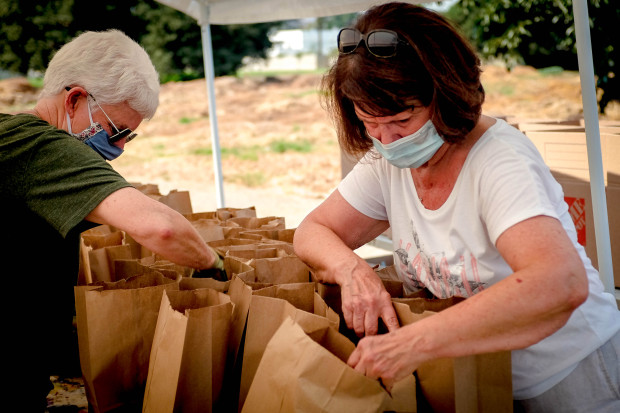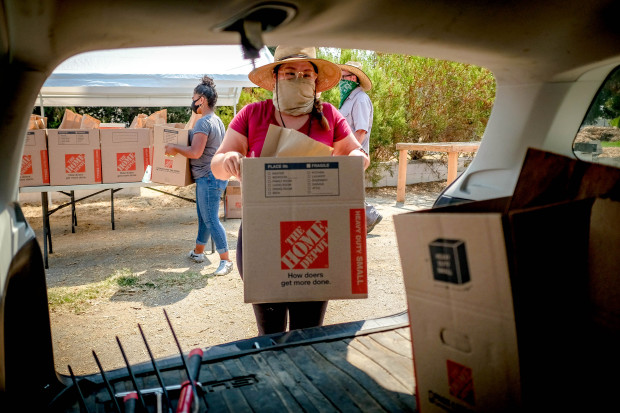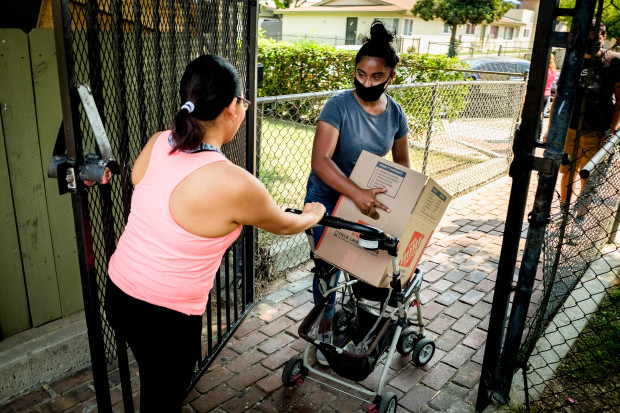Maritza Crisantos stands outside the apartment complex holding a brown box filled with produce and toiletries. From a distance, a mother pushing an empty stroller appears as she makes her way to the front gate. Their eyes meet and both greet each other as they have every Thursday morning for the past four months.
“Hola, how are you today,” Crisantos says as she places the box in the stroller. “This is a heavy one.”
She waves goodbye, checks a name off in her phone and returns to her car.
This is the first of more than 20 deliveries across south Pomona that Crisantos will complete this day. At every stop there is a different story — a hungry family, a single mother living paycheck to paycheck or someone recently laid off. But the need is always the same.
The growing demand for food and other basic needs is the idea behind Market Box, a weekly delivery service featuring fresh produce, canned food and toiletries to at-risk households in Pomona’s District 2, which stretches over most of the downtown area to the 60 Freeway, an area hit hard by the economic fallout of the coronavirus pandemic. Running the program is Lopez Urban Farm, a community-based collective that gives access to clean food from its 2 ½ acre lot near Lopez Elementary School in Pomona. The group recently moved to the lot after five years at SoPo Farm, located just around the block on White Avenue.
Cristanos, 26, a health director at Day One, a Los Angeles County-based nonprofit supporting healthy lifestyle choices, is one of a handful of volunteers who harvests and delivers the boxes for free on Thursdays to families and elderly residents in need. Most of the produce, which includes fresh kale and watermelons, is cultivated at the farm, while other items are donated by God’s Pantry, a regional nonprofit food ministry.
Stephen Yorba-Patten, director of community wellness at Pomona-based UrbanMission Community Partners, who also oversees the farm, says the weekly boxes are “emergency relief food” for many struggling households. Since April, his team of farmers has produced and distributed more than 540 boxes to families, totaling over 3,000 people. The team averages about 40 deliveries a week.
“We’re trying to keep up with all the requests that we’re getting, but we know these boxes aren’t a permanent solution but a means to stop a food emergency on our hands,” Yorba-Patten said. “This is about addressing the needs in the immediate fallout of COVID-19.”
A growing need
Demand for the service has only increased in recent months as more people have lost employment and others shy away from public encounters — even trips to the grocery store — during the current health crisis.
Food banks and food drives in Pomona have been overwhelmed with families, according to Pastor Allen Espinoza, director of Pomona Valley Food Bank. Before the pandemic, typically homeless communities relied on these services. Now, he said, there are more mothers and young kids at food banks.
“Our demand has only grown since March and it’s the reality of where we are and where many families are heading,” Espinoza said. “We’ll feed as many people as we can but sometimes it’s just not enough.”
Before the pandemic, about 20% of Pomona’s population was considered to be living in poverty. A significant number of those families live in District 2, where the average median household income is $40,033 a year, according to the U.S. Census Bureau.
Meanwhile, the pandemic hit the city hard. As of Monday, Sept. 14, Pomona leads all of Los Angeles County, with the exception of the city of Los Angeles, with 5,233 reported coronavirus cases.
This has created a ripple effect, particularly in the local economy. Prior to the pandemic, Pomona’s average unemployment rate hovered near 5% but that figure grew to 20% by the end of May, according to the federal Bureau of Labor Statistics.
“When the pandemic struck, this part of town was one of the hardest hit,” Yorba-Patten said of District 2. “Food insecurity quickly became a problem for some families that never had to endure this.”
Pomona is not alone. Job losses have mounted nationally amid the pandemic and the number of people facing food shortages has grown exponentially, especially for those in minority households, according to the Institute for Policy Research at Northwestern University. Research by the university shows that Black and Latino families have been disproportionately affected by coronavirus.
Relying on data from a national Census survey taken between April 23 and May 19, the institute found that 41% of Black households with children and 36% of Latino households with children struggled with food insecurity. Prior to the pandemic, about 25% and 17% of such households, respectively, reported they did not have enough to eat.
Health impacted
In addition to facing food shortages, disadvantaged communities are more likely to have limited access to healthy foods. This so-called food desert, defined by the Healthy Food Financing Initiative as a low-income census tract where a substantial number of residents has low access to a supermarket or large grocery store, is acutely felt in District 2, according to the United States Department of Agriculture.
Meanwhile, the area has a large number of fast food restaurants, often more accessible and affordable than a trip to the grocery store, which has impacts on the community’s overall well-being, Crisantos said.
“People have to drive across town just to get produce and essential food items,” she added. “Everywhere you look around Pomona there’s fast food or liquor stores, especially in our low-income communities which is going to affect them long term with their health.”
Yorba-Patten agreed, saying food insecurity in the area contributes to delayed development in young children, puts them at risk for certain chronic illnesses and lowers their academic achievement.
“The connection between what you eat and your health couldn’t be any clearer,” he added. “You insert COVID-19 into it and these communities will always be most at-risk.”
The barriers to accessing healthy food have only been made worse by the pandemic, according to Alfredo Camacho, Healthy Communities director at Day One.
“Coronavirus really brought out these issues in Pomona and we’re seeing that in the demand for help like with these Market Boxes,” Camacho said. “Many were somehow just making (ends meet) before but it brought everything to the forefront.”
A 2018 Community Health Needs Assessment by Pomona Valley Hospital Medical Center showed that 42.4% of respondents said they or a family member has diabetes. More than 60% responded they or a family member have high blood pressure. According to data provided by Day One, Pomona is ranked as the 18th most overweight/obese city in California and the eighth most overweight/obese city in Los Angeles County.
Obesity and diabetes are the most common underlying factors associated with COVID-19 hospitalizations, particularly in Latino and Black communities, according to the Center for Disease Control.
“These numbers show what conditions the community has been dealing with for years before COVID-19 and it’s hard to say they’re going to just get better now,” Camacho said. “Pomona isn’t designed to be a healthy city but we’re trying to change that.”
Changing habits
Market Boxes are just the “tip of the iceberg” in addressing the larger health issues in District 2, Yorba-Patten said.
“The connection between coronavirus and bad eating habits couldn’t be any clearer, which makes this a flash point moment in our community to make adjustments,” he said. “We are trying to push forward a clean food movement that anyone can be part of.”
This movement includes more access to green spaces like gardens, teaching residents quick and affordable recipes and educating people on the power of growing their own produce. It’s all part of long-term solution to a problem Lopez Urban Farm knows it can’t solve alone, which is why the nonprofit is hoping will contribute to its mission.
Councilman Victor Preciado, who represents District 2, has joined the effort, spending his own time delivering Market Boxes.
“Food insecurity has always existed in our city and COVID-19 has put a magnifying glass to the problem. It’s humbling to receive text after text, email after email, and call after call from my neighbors looking for ways to feed their families,” Preciado said. “While delivering Market Boxes, I hear children shout ‘Look Mom, we get to eat chicken today.’ The sheer number of requests exceeds our resources and motivates me to keep working.”
It’s that growing need that keeps volunteers like Crisantos showing up every Thursday to lend a hand. While the number of deliveries keeps growing, she said she knows what every box represents.
“Everyone is so grateful when I come with the food,” she added. “It’s what separates a family from going to sleep hungry that night and that’s what I’m reminded of every time someone opens that front door.”
For information on how to donate and volunteer, visit lopezurbanfarm.com.
